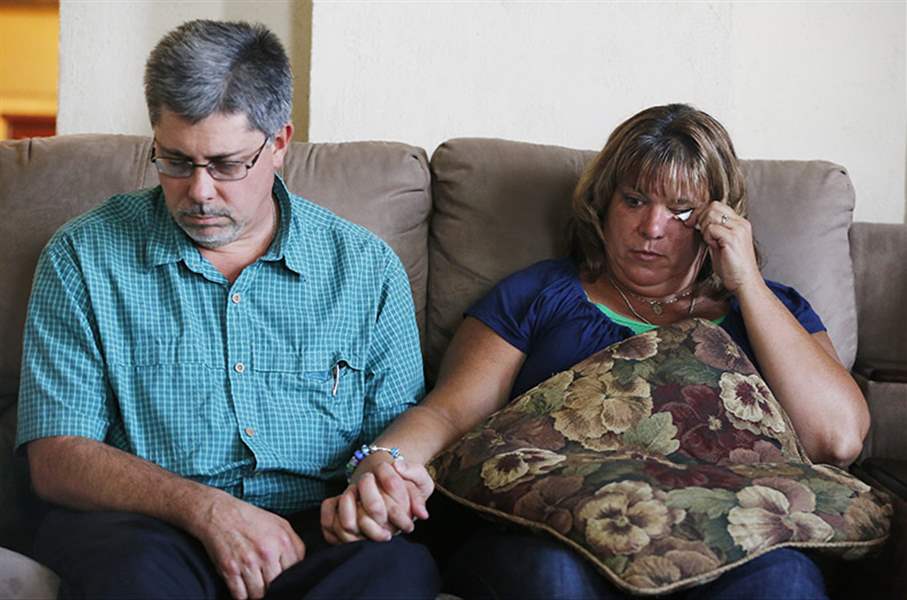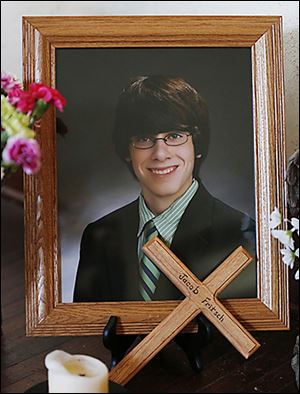
Parents of teen who killed self aim to aid kids
Out of the Darkness walk today to raise awareness of depression
9/28/2013
Donald and Kristin Fritsch talk about their son Jacob’s suicide at age 17, shortly before he would have graduated from high school.
THE BLADE/JEREMY WADSWORTH
Buy This Image

Jacob Fritsch had said he wanted to become a teacher.
Donald Fritsch stretched his arms in front of of him, like a father about to embrace his son.
He gestured with his hands, no son there to hug, as he and wife, Kristin, faced a setting sun, light fading across the fields that stretched from the Fritsch family’s Richfield Township home.
“There’s somewhere between depression,” he said, spreading his hands out with his palms facing each other, “and suicide.”
Well past the horizon, miles beyond the grove of trees behind which the sun had begun to set, was where his son Jacob last year had driven west late in the night, consumed by darkness outside and a deeper darkness in his mind.
If there was just some way, Mr. Fritsch said, to get to people before they choose suicide. Because too many who are depressed think only that the sun has set, that there’s only darkness. They forget that the the sun also rises.
Jacob Fritsch was 17 on May 6, 2012, just weeks from graduation at St. John’s Jesuit High School, when shortly before midnight he drove across the center line on U.S. 20 in eastern Fulton County, crashing head-on with a tractor-trailer.
Jacob was a good student, his parents said. He planned to be a teacher. He was quiet, but friendly. He liked basketball and bowling. In a garden outside the family home, there’s now a bowling pin near crosses and other items to memorialize the young man.
He loved The Beatles.
The family is Christian, Mr. Fritsch said, and has had a long history at St. John’s.
Jacob lived a Christian life. He didn’t drink, didn’t smoke, didn’t do drugs. And, as far as his parents know, he didn’t tell anyone he was depressed.
It wasn’t until days after the crash that his parents learned for sure their son had committed suicide.
He had no reason to be driving where he was that late at night. He told his parents he was at his part-time job, a job he’d lost several days before, something he never told them.
Just hours before the crash, he’d been at a family party. He played volleyball and laughed. An hour before the crash, he was texting a normal conversation with his best friend. He texted his brother, with whom he shared a room, about video games.
The fact that the truck driver he hit said Jacob swerved and drove straight at him was a hint at what he’d done, but not definitive.
So his mother searched his room for a note after Ohio Highway Patrol troopers came to their house.
She found nothing.
Troopers told Mr. and Mrs. Fritsch that their son’s phone had drafts of text messages to family and friends that hinted at goodbye, but that wasn’t quite a note.
The drafts said he was depressed and that he’d been hiding it. One draft was to his mother. It said that he loved her, and that he was sorry.
Days later, after Jacob’s funeral, the state patrol released his phone and iPad to the family.
On the tablet was a note. It erased any doubt. He told his family that he dreaded the future, that the world was messed up.
“He just got into a really dark place,” his mother said, “and he couldn’t get out.”
Were there signs?
Jacob’s parents look back now and ask themselves if they missed opportunities to help.

Donald and Kristin Fritsch talk about their son Jacob’s suicide at age 17, shortly before he would have graduated from high school.
His grades had started to slip in the months before the crash. For a teenager who seemed to already have his life planned out, he suddenly seemed unexcited, even apprehensive about going to college. He started spending a lot of time alone, in his room.
Many of those signs that can indicate depression are also common among teenagers.
Not only did his parents never know he was suicidal, they never even knew he was depressed. Their son had slipped into darkness under their roof, and they had no idea. That makes it even harder for them. They questioned themselves constantly.
“I look back at some of the signs,” Mr. Fritsch said, “and I wish it clicked for me that this was a sign he was depressed.”
It’s best, experts say, to keep an open line of communication with children.
The Fritsch family said they felt like they had a home where their children could talk to them.
Mrs. Fritsch even asked her son twice if he was depressed. He said no.
“All he had to do was ask for help,” Mr. Fritsch said.
But their son instead kept it all in.
Since Jacob’s death, his parents have had many frank conversations with their four other children. They insist that they talk to them, or someone, if they feel depressed. They’ve also gone to counseling, something they’ve found has helped them.
And they learned some questions will never be resolved.
“You will forever ask why,” their counselor told them. “There will never be an answer.”
Help is available
The Fritsches said they wanted to tell their story because they believe there is still a stigma against depression, that it’s a sign of weakness. They hope, Mrs. Fritsch said, that they can help other young people realize that depression isn’t something to be ashamed of.
Depression is an illness. It can be treated. Suicide is not a sign of weakness, but a sign of illness.
“I look at my son, and he was one of the strongest people I knew,” Mr. Fritsch said.
Too many people who are depressed or have some other type of mental illness may think they are alone, that they can cope, that there is no way to help how they feel.
They may never reach out for help, because no one ever told them there was any.
“Talking about it in the right format may reach that one person that feels hopeless or feels like there’s no other way out,” said Beverly Bahret, co-chairman of the Lucas County Suicide Prevention Coalition.
For some, medication works. For others, counseling. Some just need to talk with friends and family.
Ninety percent of people who commit suicide may have had a mental illness that was treatable, according to the American Foundation for Suicide Prevention.
That’s the space between Mr. Fritsch’s hands.
Catching someone closer to that left hand, the onset of illness, and treating that illness, can stop them from reaching the right hand. It can save lives.
The Fritsch family is particularly concerned that young people, like Jacob, don’t know enough about depression. So they want to start talking to them, and encouraging others to do the same.
That’s in part why the Lucas County Suicide Prevention Coalition on Friday held its third annual Suicide Prevention Conference.
Counselors, school staff, health providers, and other community members learned the basics of suicide risk, prevention efforts, interventions, and other tools.
St. John’s issued a statement applauding the Fritsch family’s efforts.
“Losing Jacob in such a manner hurts; however, we believe Jacob’s life serves as a reminder of the importance of supporting and comforting anyone who is in pain,” the school said.
Walk is today
Today, the Fritsch family will be in the Out of the Darkness Community Walk, an event put on across the nation by the American Foundation for Suicide Prevention. It’s both a fund-raiser for the foundation, and an awareness event for suicide prevention.
The walk starts at 11 a.m. at Centennial Terrace in Sylvania. According to the foundation’s Web site, more than 400 people are signed up to participate. Team names hint at the others in the community who’ve lost loved ones.
Mr. and Mrs. Fritsch said they also want to start speaking directly to kids and parents.
Educate yourself, they said. Don’t worry about being overly protective parents. Don’t be embarrassed, kids.
And talk to your friends and neighbors, your daughters and your sons.
More information about the American Foundation for Suicide Prevention is at www.afsp.org/
More information about the Lucas County Suicide Prevention Coalition is at www.lucas-suicideprevention.org/html/main.html
Contact Nolan Rosenkrans at: nrosenkrans@theblade.com or 419-724-6086, or on Twitter @NolanRosenkrans.